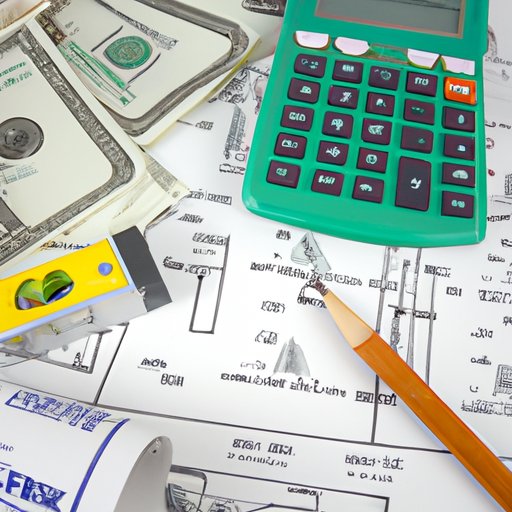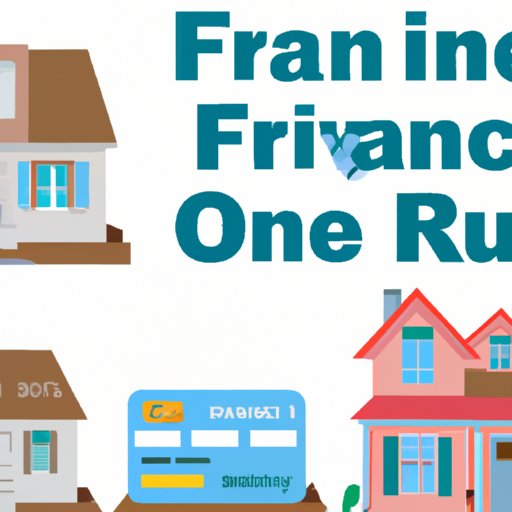Introduction
Home renovations can be an exciting and rewarding experience, but they can also be expensive. Before starting any renovation project, it’s important to understand your financing options so you can make the best decision for your budget and lifestyle.
Definition of Financing Home Renovations
Financing home renovations refers to the process of obtaining funds to cover the cost of materials and labor needed to complete a renovation project. There are several ways to finance home renovations, each with its own advantages and disadvantages.

Overview of Issues Involved in Financing Home Renovations
Before exploring your financing options, it’s important to consider the issues involved in taking out a loan or using other forms of financing. These include understanding interest rates, estimating costs, and determining how much you can borrow. It’s also important to weigh the pros and cons of financing home renovations before committing to a loan or other form of financing.

Exploring Your Financing Options for Home Renovations
There are several financing options available when it comes to home renovations. The most common are traditional bank loans, credit cards, home equity loans, and refinancing. Here is a brief overview of each option:
Traditional Bank Loans
A traditional bank loan is a loan that is issued by a bank or other financial institution. These loans typically have fixed interest rates and repayment terms, and they can be used to finance home renovations. However, these loans may require collateral, such as a house or car, and they may require a good credit score to qualify.
Credit Cards
Credit cards can also be used to finance home renovations. These cards often have low introductory interest rates and flexible repayment terms, which can make them attractive for financing projects. However, it’s important to remember that if you don’t pay off the balance in full each month, you will be charged interest on the remaining balance.
Home Equity Loans
Home equity loans are loans that are secured by the value of your home. These loans typically offer lower interest rates than traditional bank loans, but they require you to use your home as collateral. This means that if you fail to make payments, your home could be at risk.
Refinancing
Refinancing is another option for financing home renovations. This involves taking out a new loan to pay off an existing loan. Refinancing can be a good option if you can find a loan with a lower interest rate than your current loan. However, this type of loan may come with additional closing costs and fees, so it’s important to do your research before deciding if refinancing is right for you.

What to Know When Financing a Home Renovation
When considering any type of financing for home renovations, there are a few things you should know. Understanding interest rates, estimating costs, and determining how much you can borrow are all important steps in the process.
Understanding Interest Rates
Interest rates vary depending on the type of loan you choose and your credit score. It’s important to compare different lenders and interest rates to find the best deal. Keep in mind that higher interest rates mean higher monthly payments, so it’s important to find a loan with a low interest rate if possible.
Estimating Costs
Before taking out a loan or other form of financing, it’s important to estimate the cost of the renovation project. This includes the cost of materials, labor, and any additional expenses. Estimating the cost of the project can help you determine how much money you need to borrow and what type of loan is best for your budget.
Determining How Much You Can Borrow
When it comes to financing home renovations, it’s important to determine how much money you can realistically afford to borrow. This will depend on your income, credit score, and debt-to-income ratio. Taking the time to calculate these numbers can help you make sure you’re not overborrowing and putting yourself at risk.
Pros and Cons of Financing Home Renovations
Financing home renovations can be beneficial in some cases, but there are also drawbacks to consider. It’s important to weigh the pros and cons before making a decision.
Benefits of Financing
One of the main benefits of financing home renovations is that it allows you to spread the cost of the project over a longer period of time. This can make it easier to afford the renovations without having to pay for them all at once. Additionally, some loans and financing options may offer tax benefits or other incentives.
Drawbacks of Financing
The main drawback of financing home renovations is that it can be expensive. Interest rates on loans can add up over time, and some loans may come with additional fees or restrictions. Additionally, if you fail to make payments on time, you may face late fees or other penalties.
Tips for Smartly Financing Home Renovations
There are a few tips to keep in mind when financing home renovations. These can help you make sure you get the best deal possible and avoid any potential pitfalls.
Shop Around
It’s important to shop around and compare different lenders and interest rates before taking out a loan. This can help you find the best deal and make sure you’re not being taken advantage of.
Be Prepared
Before applying for a loan, it’s important to gather all of the necessary documents and information. This includes proof of income, credit score, and debt-to-income ratio. Having this information ready can help the process go more smoothly.
Make Sure You Can Afford the Payments
It’s important to make sure you can afford the payments on any loan or financing you take out. Taking out a loan that you can’t afford can put you in a difficult financial situation, so it’s important to make sure you’re comfortable with the payments before committing to a loan.

Assessing the Costs and Benefits of Financing Home Renovations
When assessing the costs and benefits of financing home renovations, it’s important to consider both the short-term and long-term impacts. Calculating the overall cost of the loan and weighing the long-term benefits can help you make an informed decision.
Calculating the Overall Cost of the Loan
When calculating the overall cost of the loan, it’s important to consider the interest rate and any additional fees or charges. This can help you determine the total cost of the loan and whether it is a good deal or not.
Weighing the Long-Term Benefits
It’s also important to consider the long-term benefits of financing home renovations. For example, increasing the value of your home through renovations can be a great investment. Additionally, completing the project may increase the enjoyment of your home and add convenience or comfort.
Conclusion
Financing home renovations can be a great way to make your dream renovations a reality. There are several financing options available, including traditional bank loans, credit cards, home equity loans, and refinancing. It’s important to understand your financing options, weigh the pros and cons, and make sure you can afford the payments before committing to a loan or other form of financing.
(Note: Is this article not meeting your expectations? Do you have knowledge or insights to share? Unlock new opportunities and expand your reach by joining our authors team. Click Registration to join us and share your expertise with our readers.)
